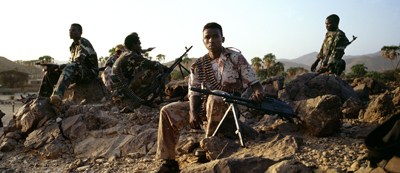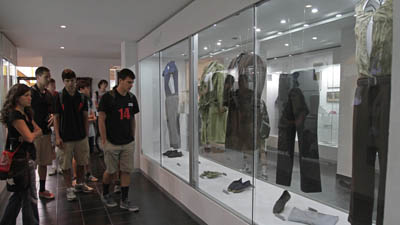
What to do if Google warns of state-sponsored attack
Some journalists continue to receive the warning from Google about state-sponsored attacks that we mentioned last week. The message appears on top of logged-in services like Gmail. Occasionally it will disappear for a few hours and then reappear, but there is no way to remove it.
Video: Journalists in exile
Four East African journalists who were forced to flee their countries tell about their experiences, difficulties, and hopes for the future. (3:43)Read CPJ’s report, “Journalists in exile: Crisis in East Africa,” for more information about journalists forced to go into exile.

For exiled Eritreans in Sudan, fear greater than most
With the launch of CPJ’s most recent exile report, I will have worked exactly three years for our Journalist Assistance program. More than 500 cases later, I have helped journalists who have gone into hiding or exile to escape threats; those in need of medicine and other support while in prison, and journalists injured after…
Spreading the security message
Video streaming by UstreamOn the frontlines of global reporting, knowledge is safety. CPJ’s event series to promote our new Journalist Security Guide continued Wednesday in Washington, D.C. where we teamed up with Internews for a panel discussion on journalist security on-site and online.
State-sponsored attacks: open season on online journalists
The last few weeks have offered the strongest indications yet that nation-states are using customized software to exploit security flaws on personal computers and consumer Internet services to spy on their users. The countries suspected include the United States, Israel, and China. Journalists should pay attention–not only because this is a growing story, but because…
Defining role of the press in genocide prevention
Talking about genocide prevention in the shadow of the Auschwitz-Birkenau extermination camps brings an intense and unique gravity to the discussions. The academic presentations cannot extract themselves from the looming presence of the barbed wires and grim towers surrounding the Nazis’ most infamous death factory.
Computer crime laws belie Thai claim to modern society
At online discussion sites all over the world, comments are posted on the Web as soon as they are written. People argue, inform, express anger, and voice fears. Some say things in the heat of the moment that they might go on to regret. Others are elliptical and obscure. The enabling of such conversations is…
Free expression in Americas goes beyond left or right
On Sunday the general assembly of the Organization of American States will convene in Bolivia in the verdant, highland valley city of Cochabamba. The 35 member states (every nation in the region except Cuba) are expected to vote on a measure that, if passed, could curtail free expression and press throughout the hemisphere and put…

Solidarity, a key to security, eludes Salvadoran press
No other journalists are remembered quite like this. Visitors looking through the glass display at the Monsignor Romero Center & Martyrs Museum in San Salvador see the pajamas and other clothes that three Jesuit university priests were wearing when they were shot down by automatic rifle fire. A series of clear containers are filled with…